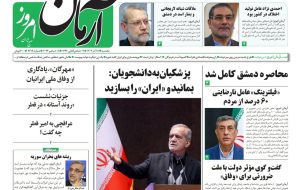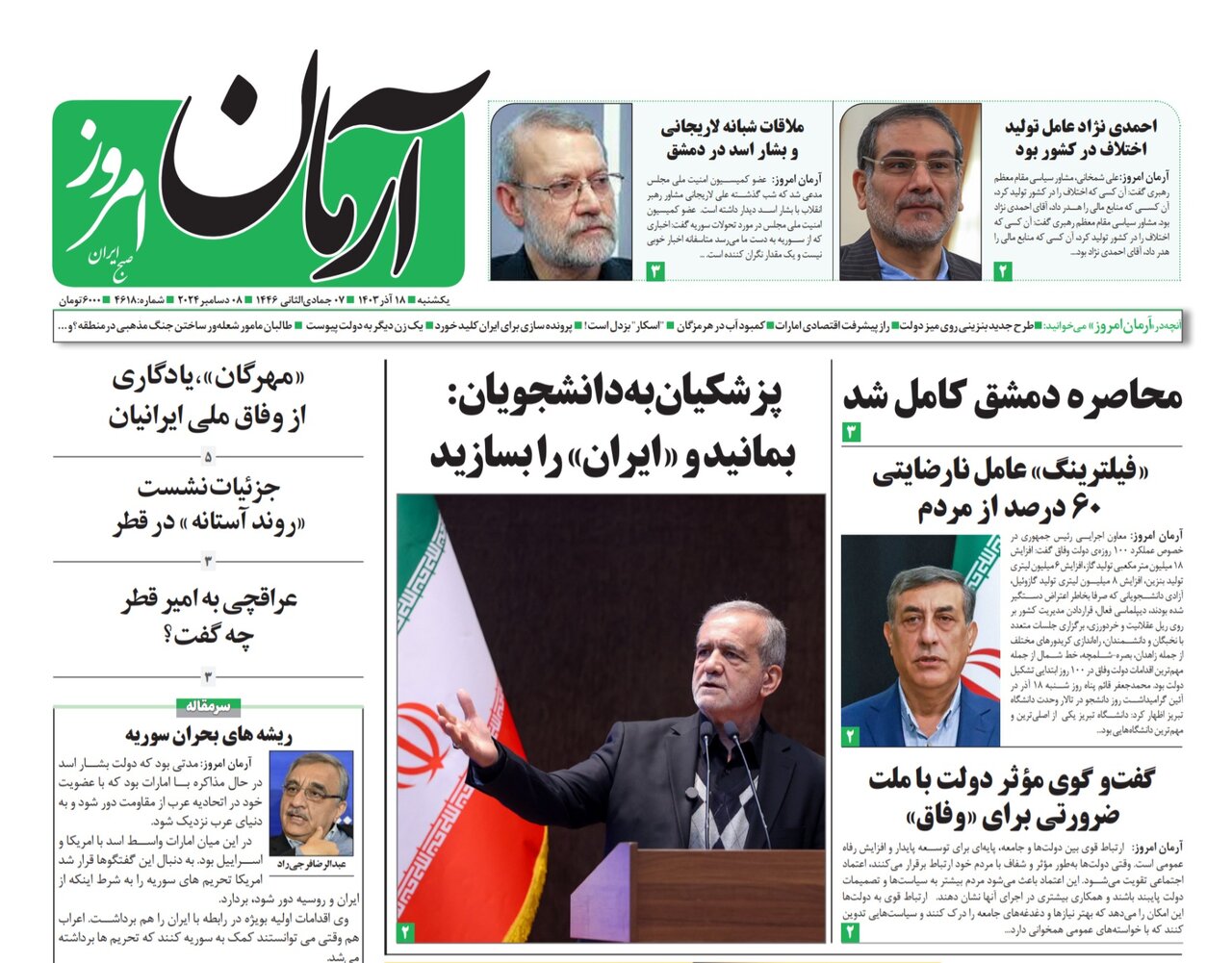Arman-e Emrooz: Shifting alliances in Syria
TEHRAN – The editorial in Arman-e Emrooz, penned by Abdolreza Faraji-Rad, explored the dynamics behind Syria’s recent developments. It noted that Bashar al-Assad’s government had been negotiating with the UAE to realign Syria with the Arab world and distance itself from Iran and Russia. The UAE mediated talks between Assad, the U.S., and Israel, with


TEHRAN – The editorial in Arman-e Emrooz, penned by Abdolreza Faraji-Rad, explored the dynamics behind Syria’s recent developments.
It noted that Bashar al-Assad’s government had been negotiating with the UAE to realign Syria with the Arab world and distance itself from Iran and Russia. The UAE mediated talks between Assad, the U.S., and Israel, with the U.S. offering to lift sanctions if Syria complied. Assad reportedly took initial steps, especially regarding Iran, but these efforts clashed with Turkey’s regional ambitions. In response, Turkey mobilized the militants, coordinated with the U.S. and Israel, and committed to dismantling Syria’s Resistance movement, a strategy preferred by Washington. The editorial concluded that these developments have significantly enhanced Turkey’s geopolitical influence. The paper warned that Turkey’s revived focus on Zangezur and potential Azerbaijani aggression against Syunik could reshape the regional balance further.
Ettelaat: Iran’s calculated approach to the Syrian crisis
In a note, Ettelaat reported the views by former Iranian MP Ali Motahari on the fall of Syrian President Bashar al-Assad’s government, where he emphasized Iran’s calculated approach to the crisis. In a social media post, Motahari wrote, “Iran’s stance on the recent developments in Syria was prudent. By not opposing the large segment of the Syrian population that supported Assad’s opposition, Iran successfully avoided a Sunni-Shia conflict and a fratricidal war among Muslims, which would have served the interests of the United States and Israel.” He further analyzed the nature of Assad’s opposition, describing its core as aligned with the Muslim Brotherhood and anti-Zionist. Motahari also suggested that efforts should be made to engage with and win over the opposition’s core group through dialogue.
Siasat-e-Rooz: Britain’s goal is to replace the oppressor with the oppressed
Siasat-e-Rooz devoted its editorial to Britain’s policy in support of the Zionist regime against Iran. The paper said: England considers itself committed to supporting the Zionist regime and the officials in London are determined to purify the aggressive and terrorist nature of this regime and justify the crisis building and aggressive behavior of Tel Aviv in the region against Iran and Syria to divert public opinion from punishing the leaders of this regime. Britain has a history of replacing the oppressor with the oppressed. In a situation where the world condemned the Zionist regime’s violation of Iran’s territory, the British once again hypocritically wanted to create an illusory legitimacy for the Zionists’ violation of Iran’s territory to dissuade Iran from the promised Operation True Promise III. Along with the diplomatic protest to London, Iran must fulfill True Promise III as soon as possible so that the illusion of the Zionists’ supremacy disappears.
Donya-e-Eqtesad: FATF dilemma
In an article, Donya-e-Eqtesad dealt with the financial problems that Iran is facing for not joining the FATF and said: Some people believe that Iran’s membership and commitment to FATF is only aimed at developing trade with Western countries. But the important point is that the country’s financial system is facing hurdles with international money transfers. This issue has not only made the country dependent on the financial centers of third countries but has also led to an increase in the cost of doing business with the outside world, and as a result, Iranian businesspersons are facing inconveniences in foreign trade. On the other hand, Iran’s commitment to the provisions of FATF does not necessarily mean accepting all its provisions. Re-examining the issue of Iran’s membership in FATF is an effective step toward facilitating Iran’s trade with regional and extra-regional countries. Iran’s withdrawal from the FATF blacklist will reduce costs and accelerate Iran’s regional financial exchanges.
